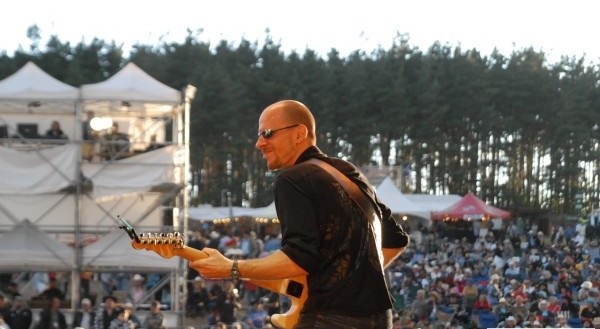Author - Eric Normand
By the time Eric Normand relocated from New England to Nashville in the summer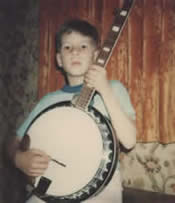 of 2002 he had already invested a lifetime into music. Beginning at a very early age, many years before he would ever see the countryside from a tour bus window, or set foot upon the stage of the Grand Ole Opry, he found himself surrounded by music. With dad on the bass and mom on guitar and vocals, Eric found himself soaking in their regular performances at churches, nursing homes, and family gatherings. Although much of what they played was folk music, it was dad’s record collection of old school blues and rock that that seemed to be of most interest to a young and impressionable Eric.
of 2002 he had already invested a lifetime into music. Beginning at a very early age, many years before he would ever see the countryside from a tour bus window, or set foot upon the stage of the Grand Ole Opry, he found himself surrounded by music. With dad on the bass and mom on guitar and vocals, Eric found himself soaking in their regular performances at churches, nursing homes, and family gatherings. Although much of what they played was folk music, it was dad’s record collection of old school blues and rock that that seemed to be of most interest to a young and impressionable Eric.
Eric showed a desire to be different with his first two forays into playing an instrument, the banjo at age 8, and the piano at age 10. But it wasn't until hearing a r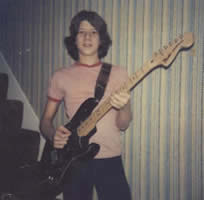 ecording of Jimi Hendrix at the age of 12 that he would discover the electric guitar as his true calling. With a little help from mom and a couple of other young guitar buddies, he would spend his high school years learning riffs and songs from records, jamming with friends, and exploring the world in the way only a teenager can.
ecording of Jimi Hendrix at the age of 12 that he would discover the electric guitar as his true calling. With a little help from mom and a couple of other young guitar buddies, he would spend his high school years learning riffs and songs from records, jamming with friends, and exploring the world in the way only a teenager can.
By his junior year of high school, he was taking music pretty seriously and became interested in attending the world renowned Berklee College of Music in Boston Massachusetts. After a few unsuccessful attempts followed by a couple of years of formal training, he was accepted and began his studies as a performance major.
In the fall of 1989 he began what would be a 14 year adventure into the world of the nightclub performer, playing throughout the Northeast in several successful top 40, rock, and blues bands. It was during this time period that he discovered his knack for organizing and problem-solving and wound up as the bandleader in many of these groups, eventually owning a box truck full of state-of-the-art PA equipment.
Along the way, the combination of an inquisitive mind with a desire to share his knowledge would lead to an alternate career, that of the music teacher. By the time he headed for Nashville, he had built up a roster of 35 private students, teaching guitar and bass out of his home and several music stores. Always interested in helping others develop musically, Eric encouraged his students to be involved with band activities, and would often invite students to sit in with his own band.
For Eric, moving to Nashville was just the next step in the lifelong quest of a professional musician, and he arrived eager to learn. With the full support of his wife and son, and some advice from a friend, he began his freshman year in Nashville with the same wide-eyed wonder and openness he had when he attended his first year at Berklee, some 15 years before.
Growing up on a diet of classic rock, blues, and jazz, he would now have to dig in hard to get up to speed with country music. Financing his first year in Nashville with a combination of credit cards and his new career of selling off musical equipment on eBay, he spent many long hours working on his chicken pickin’ technique and learning country standards while going out on the town nightly to network.
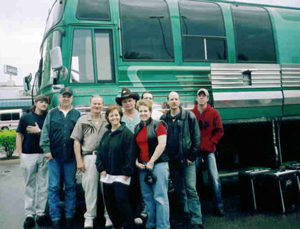
In addition to some sporadic gigs around town, that first year found Eric working a handful of tour dates as guitarist and bandleader for country music legend Vern Gosdin. Also within that first year, he spent a few months working as the house guitarist at the weekly variety show, Libby’s, in Daysville Kentucky, once famous for its live radio show, and the launching of several major Nashville artists.
About a year into this new life of a country commando, he landed his first road gig as a guitar tech on the Toby Keith tour. Going from gigs on Broadway and Printers Alley to the biggest tour in country music was another eye-opener, and the experience would provide him with a wealth of knowledge and new experiences. Working as a tech on a tour of this magnitude would grant a Birdseye perspective into the daily activities of an artist, band, and crew on this level, as well as what has to go on behind the scenes to make a large scale concert and tour happen. The tour was a whirlwind, playing 90 concerts in many major cities across all lower 48 states in about a six-month period, as well as making several appearances on the popular late-night shows.
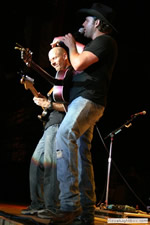
The following year would grant Eric an opportunity to work as a guitar player on the Honky-Tonk Tailgate Party, a package tour in which one band backed four artists nightly: Rhett Akins, Daryle Singletary, Chad Brock, and Jeff Carson. It was during this time that Eric enjoyed his first experiences performing on the Grand Ole’ Opry; backing Singletary and Akins on numerous occasions. By the fall of 2005, this tour disbanded, and Eric stayed on with Rhett. This transitional point would create a void in the position of tour manager within Rhett's new organization, and Eric seized this opportunity, seeing it as another opportunity for learning and advancement.
Continuing some in town nightclub work along the way, it was during this period that Eric began playing on some paid recording sessions, experiences which would lead him to build his own recording studio, Music on a Hill. On one memorable session in a major recording studio in town, Eric found himself playing guitar behind Hank Williams Jr., when the legend made a cameo appearance for the recording of the Rhett Akins hit, Kiss My Country Ass.
Adventuring deep into the world of composition, Eric began recording a vast library of instrumental music, and this would lead to the licensing of his music to the television shows Realtrees Road Trips with Michael Waddell, the Tommy Wilcox show, and the documentary Chef Da Riz by award winning filmmaker Jeremy Campbell. Along the way he also learned how to record songwriter demos, something he still does to this day.
For Eric, this second half of his life, a life which was born in Nashville, has peeled back the curtain of mystery that had previously cloaked the music biz, as it has, and continues to do for most musicians not working within it. While his story is unique, the experiences he has had are similar to many working in this industry, and while attainable for some who desire a career within it, this world remains a mystery to most.
Always searching for answers, and often feeling compelled to share the gifts of knowledge, Eric’ first major work as an author, The Nashville Musician's Survival Guide, is a useful guide and perspective about the music industry. More importantly, it is a story about people, music, and the intersecting roads they travel. And it is perhaps the teacher within Eric that has brought him to put forth what he has learned along those roads in the hopes of helping others achieve their dreams
